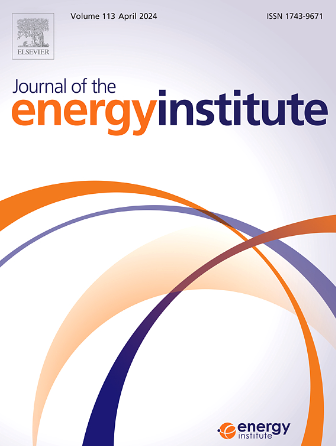Characteristics of enhanced plasma in ethanol liquid-phase discharge with a third electrode
IF 5.6
2区 工程技术
Q2 ENERGY & FUELS
引用次数: 0
Abstract
Microwave liquid-phase discharge plasma can reform alcohol to produce large amounts of hydrogen because liquid-phase discharge has the advantage of high gas-liquid mass transfer efficiency and high plasma density. However, there is less research on the plasma characteristics of microwave liquid-phase discharge, and the characteristics of plasma directly affect the efficiency of hydrogen production. In this paper, the effects of different microwave input powers and the use of different heights of the third-electrode on plasma characteristics and bubble residence time during liquid-phase discharge were investigated. The study revealed that as microwave power increased from 900 W to 1500 W, plasma volume tripled, directly influencing hydrogen production. Additionally, employing the height of the third-electrode significantly changed plasma volume and bubble residence time, the energy yield of hydrogen production was up to 0.60 Nm3/kWh.
求助全文
约1分钟内获得全文
求助全文
来源期刊

Journal of The Energy Institute
工程技术-能源与燃料
CiteScore
10.60
自引率
5.30%
发文量
166
审稿时长
16 days
期刊介绍:
The Journal of the Energy Institute provides peer reviewed coverage of original high quality research on energy, engineering and technology.The coverage is broad and the main areas of interest include:
Combustion engineering and associated technologies; process heating; power generation; engines and propulsion; emissions and environmental pollution control; clean coal technologies; carbon abatement technologies
Emissions and environmental pollution control; safety and hazards;
Clean coal technologies; carbon abatement technologies, including carbon capture and storage, CCS;
Petroleum engineering and fuel quality, including storage and transport
Alternative energy sources; biomass utilisation and biomass conversion technologies; energy from waste, incineration and recycling
Energy conversion, energy recovery and energy efficiency; space heating, fuel cells, heat pumps and cooling systems
Energy storage
The journal''s coverage reflects changes in energy technology that result from the transition to more efficient energy production and end use together with reduced carbon emission.
 求助内容:
求助内容: 应助结果提醒方式:
应助结果提醒方式:


